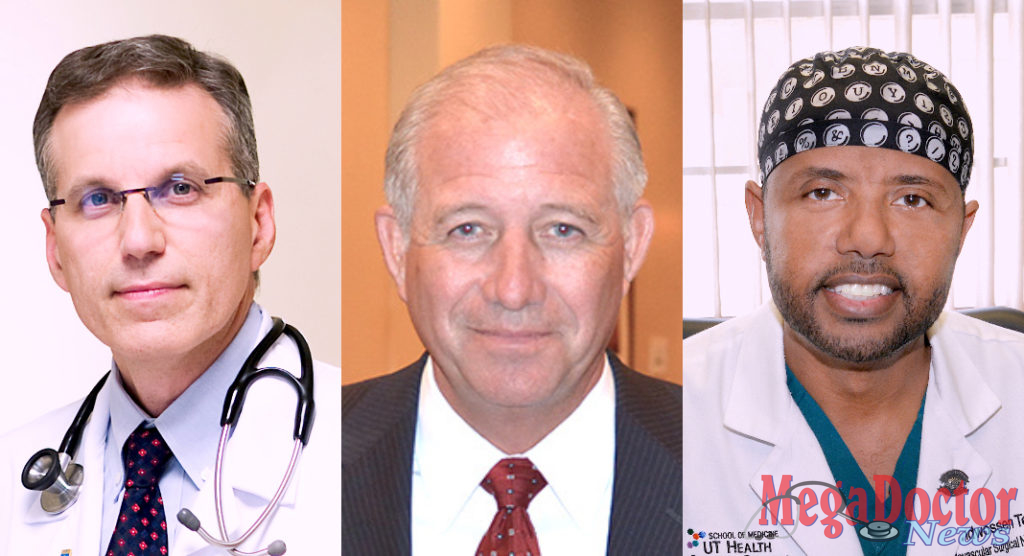
Mega Doctor News
HARLINGEN — In recognition of its commitment to ensuring that local stroke patients receive high-quality healthcare, Valley Baptist Medical Center-Harlingen has received the American Heart Association/American Stroke Association’s Get With The Guidelines Target: Stroke Honor Roll Elite Plus Gold Plus Quality Achievement Award.
The award recognizes Valley Baptist-Harlingen’s commitment to ensuring stroke patients receive the most appropriate treatment according to nationally recognized, research-based guidelines based on the latest scientific evidence.
Valley Baptist-Harlingen earned the award by meeting specific quality achievement measures for the diagnosis and treatment of stroke patients at a set level for a designated period. These measures include evaluation of the proper use of medications and other stroke treatments aligned with the most up-to-date, evidence-based guidelines with the goal of speeding recovery and reducing death and disability for stroke patients. Before discharge, patients should also receive education on managing their health, get a follow-up visit scheduled, as well as other care transition interventions.
“We are pleased to recognize Valley Baptist-Harlingen for its commitment to stroke care,” said Lee H. Schwamm, M.D., national chairperson of the Quality Oversight Committee and Executive Vice Chair of Neurology, Director of Acute Stroke Services for Massachusetts General Hospital in Boston, Mass. “Research has shown that hospitals adhering to clinical measures through the Get With The Guidelines quality improvement initiative can often see fewer readmissions and lower mortality rates.”
Manny Vela, CEO for Valley Baptist Medical Center-Harlingen and Valley Baptist Health System, said the awards from the American Heart Association/American Stroke Association are recognition of Valley Baptist’s efforts to provide the community with award-winning healthcare close to home.
“Valley Baptist is always going to try to develop service lines that offer care so that our folks from the Rio Grande Valley never have to leave the Valley to receive world-class care,” he said. “Our efforts in stroke care are a prime example of those initiatives, and these awards would not happen without the tireless work and dedication of our physicians, nurses, and the entire team at Valley Baptist.”
To qualify for the Target: Stroke Honor Roll Elite Plus, hospitals must meet quality measures developed to reduce the time between the patient’s arrival at the hospital and treatment with the clot-buster tissue plasminogen activator, or tPA, the only drug approved by the U.S. Food and Drug Administration to treat ischemic stroke. If given intravenously in the first three hours after the start of stroke symptoms, tPA has been shown to significantly reduce the effects of stroke and lessen the chance of permanent disability.
These quality measures are designed to help hospital teams follow the most up-to-date, evidence-based guidelines with the goal of speeding recovery and reducing death and disability for stroke patients.
“A stroke patient loses 1.9 million neurons each minute stroke treatment is delayed. This recognition further demonstrates our commitment to delivering advanced stroke treatments to patients quickly and safely,” said Dr. Wondwossen Tekle, Director of Stroke and Neurocritical Care for Valley Baptist Medical Center-Harlingen and Assistant Professor of Neurology and Radiology at the University of Texas Health Sciences Center San Antonio and Rio Grande Valley.
In addition to the recognition from the American Heart Association and American Stroke Association, Valley Baptist Medical Center-Harlingen is the first certified Comprehensive Stroke Center in the Rio Grande Valley and south of San Antonio and has been treating the Valley’s most difficult stroke cases since 2016.
According to the American Heart Association/American Stroke Association, stroke is the fifth-leading cause of death and a leading cause of adult long-term disability in the United States. On average, someone in the U.S. suffers a stroke every 40 seconds and nearly 795,000 people suffer a new or recurrent stroke each year.








